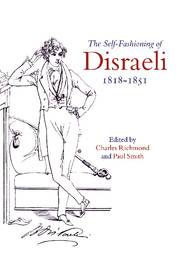Book contents
- Frontmatter
- Contents
- List of contributors
- Preface
- Introduction
- 1 Disraeli's education
- 2 Disraeli's romanticism: self-fashioning in the novels
- 3 Disraeli's crucial illness
- 4 Disraeli and orientalism
- 5 ‘A Hebrew to the end’: the emergence of Disraeli's Jewishness
- 6 Disraeli's interpretation of English history
- 7 Disraeli's politics
- Notes
- Index
6 - Disraeli's interpretation of English history
Published online by Cambridge University Press: 19 March 2010
- Frontmatter
- Contents
- List of contributors
- Preface
- Introduction
- 1 Disraeli's education
- 2 Disraeli's romanticism: self-fashioning in the novels
- 3 Disraeli's crucial illness
- 4 Disraeli and orientalism
- 5 ‘A Hebrew to the end’: the emergence of Disraeli's Jewishness
- 6 Disraeli's interpretation of English history
- 7 Disraeli's politics
- Notes
- Index
Summary
One of the principal ways in which Disraeli fashioned an identity and a role for himself in public life was by constructing a particular interpretation of the past and giving it repeated publicity through a steady stream of writings. He began the enterprise with the publication in 1826 of his socio-political novel Vivian Grey and, following additions in correspondence and other publications, gave it fullest expression in a political tract, Vindication of the English Constitution, published in complete and abbreviated forms in 1835–6. Later, in the 1840s, he enlarged on his interpretation in his trilogy of novels, particularly on those aspects related to race, but from a reading of all Disraeli's works – his publications, his correspondence and his speeches – one of the most remarkable features of his thesis was the consistency with which he adhered to it over more than fifty years. The views that he formed in the late 1820s and early 1830s remained substantially the same until his death.
Although his interpretation is well known to Disraeli scholars, most praise its imaginative qualities but find it lacking in substance. W. F. Monypenny, for example, in a more optimistic judgement than many, wrote in 1912 of its containing an element of paradox but also large measures of truth, originality and insight that would be well received by those who were being emancipated from the ‘tyranny of the Whig writers’. Since then, however, judgements have been less favourable.
- Type
- Chapter
- Information
- The Self-Fashioning of Disraeli, 1818–1851 , pp. 131 - 151Publisher: Cambridge University PressPrint publication year: 1999



